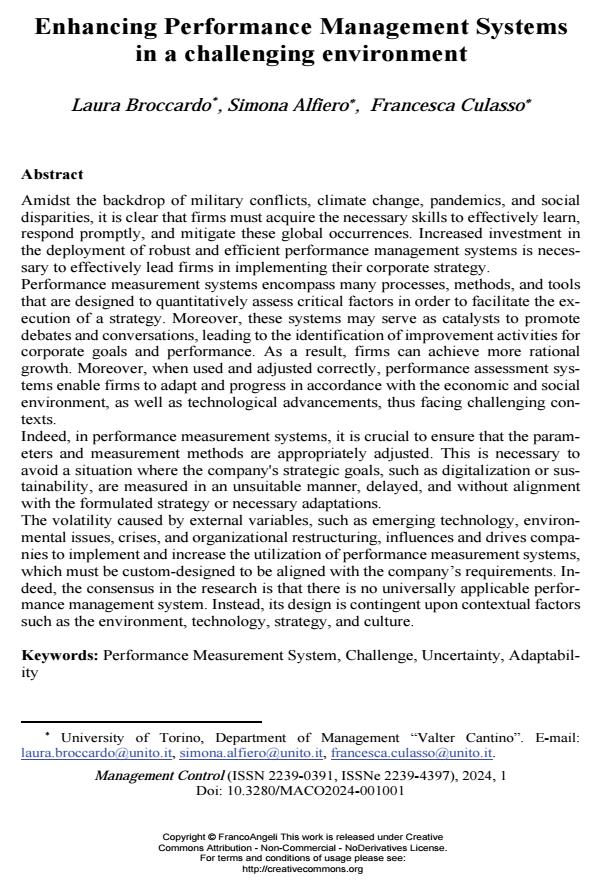Enhancing Performance Management Systems in a challenging environment
Titolo Rivista MANAGEMENT CONTROL
Autori/Curatori Laura Broccardo, Simona Alfiero, Francesca Culasso
Anno di pubblicazione 2024 Fascicolo 2024/1
Lingua Inglese Numero pagine 10 P. 5-14 Dimensione file 203 KB
DOI 10.3280/MACO2024-001001
Il DOI è il codice a barre della proprietà intellettuale: per saperne di più
clicca qui

FrancoAngeli è membro della Publishers International Linking Association, Inc (PILA), associazione indipendente e non profit per facilitare (attraverso i servizi tecnologici implementati da CrossRef.org) l’accesso degli studiosi ai contenuti digitali nelle pubblicazioni professionali e scientifiche.
Amidst the backdrop of military conflicts, climate change, pandemics, and social disparities, it is clear that firms must acquire the necessary skills to effectively learn, respond promptly, and mitigate these global occurrences. Increased invest-ment in the deployment of robust and efficient performance management sys-tems is necessary to effectively lead firms in implementing their corporate strategy. Performance measurement systems encompass many processes, methods, and tools that are designed to quantitatively assess critical factors in order to facilitate the execution of a strategy. Moreover, these systems may serve as catalysts to promote debates and conversations, leading to the identification of improvement activities for corporate goals and performance. As a result, firms can achieve more rational growth. Moreover, when used and adjusted correctly, performance as-sessment systems enable firms to adapt and progress in accordance with the eco-nomic and social environment, as well as technological advancements, thus facing challenging contexts. Indeed, in performance measurement systems, it is crucial to ensure that the pa-rameters and measurement methods are appropriately adjusted. This is necessary to avoid a situation where the company's strategic goals, such as digitalization or sustainability, are measured in an unsuitable manner, delayed, and without align-ment with the formulated strategy or necessary adaptations. The volatility caused by external variables, such as emerging technology, envi-ronmental issues, crises, and organizational restructuring, influences and drives companies to implement and increase the utilization of performance measure-ment systems, which must be custom-designed to be aligned with the company’s requirements. Indeed, the consensus in the research is that there is no universally applicable performance management system. Instead, its design is contingent up-on contextual factors such as the environment, technology, strategy, and culture.
Parole chiave:Performance Measurement System, Challenge, Uncertainty, Adapta-bility
- Controllo di gestione e relazioni intraorganizzative: la prospettiva del controller Oppi Chiara, Vagnoni Emidia, Cattaneo Cristiana, Galizzi Giovanna, in MANAGEMENT CONTROL 3/2024 pp.155
DOI: 10.3280/MACO2024-003008 - Determinants of Corporate Carbon Disclosure: A Systematic Framework and Agenda for Future Research Teresa Izzo, Ludovica Evangelista, Daniela Mancini, Gianluca Risaliti, in Accounting & Finance acfi.70180/2026
DOI: 10.1111/acfi.70180
Laura Broccardo, Simona Alfiero, Francesca Culasso, Enhancing Performance Management Systems in a challenging environment in "MANAGEMENT CONTROL" 1/2024, pp 5-14, DOI: 10.3280/MACO2024-001001